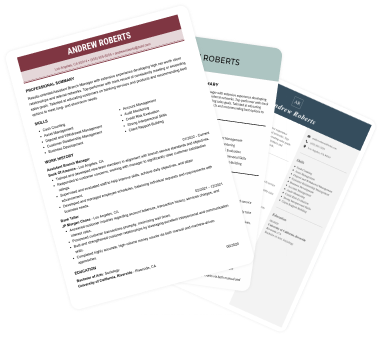Create a professional CV now!
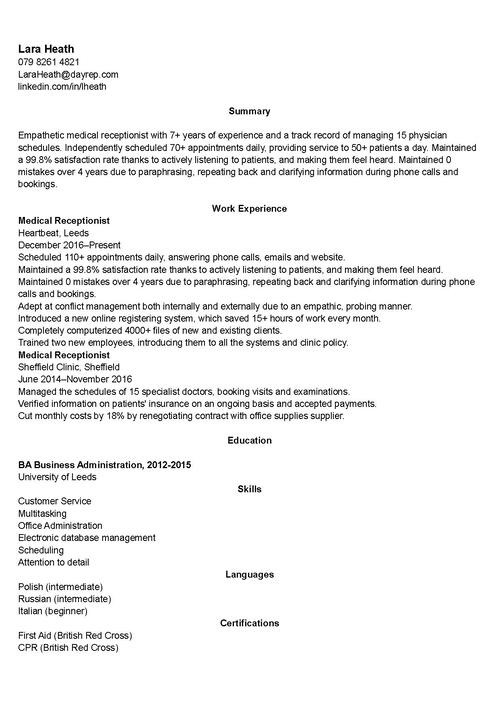 NO
NO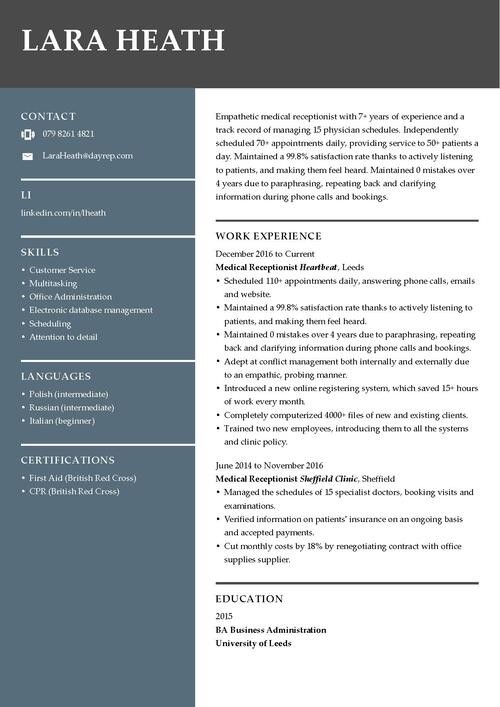 YES
YESLast updated on 29 December, 2025
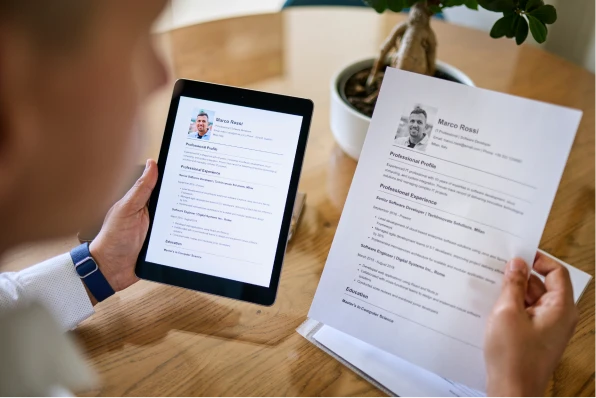
Active listening skills are methods of actively engaging with the person you’re conversing with through observing body language and other non-verbal cues, feeding back, and eliciting necessary information. It allows the speaker to feel respected and understood—and the listener to understand.
Even if you were actively listening in school, it’s almost certain nobody’s ever taught you to describe methods of active listening on your CV. But this guide will do just that, so listen up!
Create an effective CV in minutes. Choose a professional CV template and fill in every section of your CV in a flash using ready-made content and expert tips.
Create a professional CV now!
 NO
NO YES
YESWe created the sample on the left using our builder. See other good CV examples like this one.
What additional skills should you include on your CV? Take a look at these guides:
Lara Heath
079 8261 4821
LaraHeath@dayrep.com
linkedin.com/in/lheath
Summary
Empathetic medical receptionist with 7+ years of experience and a track record of managing 15 physician schedules. Independently scheduled 70+ appointments daily, providing service to 50+ patients a day. Maintained a 99.8% satisfaction rate thanks to actively listening to patients, and making them feel heard. Maintained 0 mistakes over 4 years due to paraphrasing, repeating back and clarifying information during phone calls and bookings.
Work Experience
Medical Receptionist
Heartbeat, Leeds
December 2016–Present
Medical Receptionist
Sheffield Clinic, Sheffield
June 2014–November 2016
Education
BA Business Administration, 2012-2015
University of Leeds
Skills
Languages
Certifications
So how do we capture these ethereal transferable skills and describe methods of active listening on your CV? Aren’t they just basic communication skills? No, it’s much more than that. Here is the active listening method:
There is only one way to create effective two-way communication. Nobody likes only being told, without being listened to. Engaging with the conversation, extracting the core of the issue and all the relevant information; these are soft skills beneficial to both parties.
Looking away or fidgeting are tell-tale signs you can not wait until you are done listening. Observe your speaker, including their body language, and try to drown out distracting thoughts and the environment.
Most people can tell when you’re not paying attention or just waiting for your turn to speak away. Smile, keep open and forward-facing body language, and don’t forget to throw in a nod here, and some verbal affirmation there.
Don’t talk over somebody, don’t squeeze your rebuttal in before they are done. Interrupting never leads to anything positive, and means you are missing out on fully understanding what they had to say.
Paraphrase your speaker’s points to get confirmation and to let them know you’re really hearing out what they said. Using phrases such as ‘So it sounds like (…)’ and ‘So what you’re saying is (…)’ can really help.
By asking a question that requires some elaboration from the speaker, you will be gaining more insight on their perspective, and will get closer to the truth. Yes/no questions are often leading and can introduce unhelpful binarity.
Once you have heard a nugget that seems like it’s pointing in the right direction, follow up. Probe for the details you need, even if it’s as simple as ‘Tell me more about that’.
If you missed or misunderstood something, don’t let the conversation run on for the fear of looking silly. You will look silly later when you don’t know. Asking for clarification shows you’re listening and really trying to gain understanding.
Be calm, respectful—but honest and assertive in your response. Don’t speak to somebody in a way you wouldn’t enjoy yourself. You gain nothing by putting someone on the back foot or showing them how much more important or smart you are. (If you do, you are not.)
A strong CV summary will convince the recruiter you’re the perfect candidate. Save time and choose a ready-made personal statement written by career experts and adjust it to your needs in the LiveCareer CV builder.
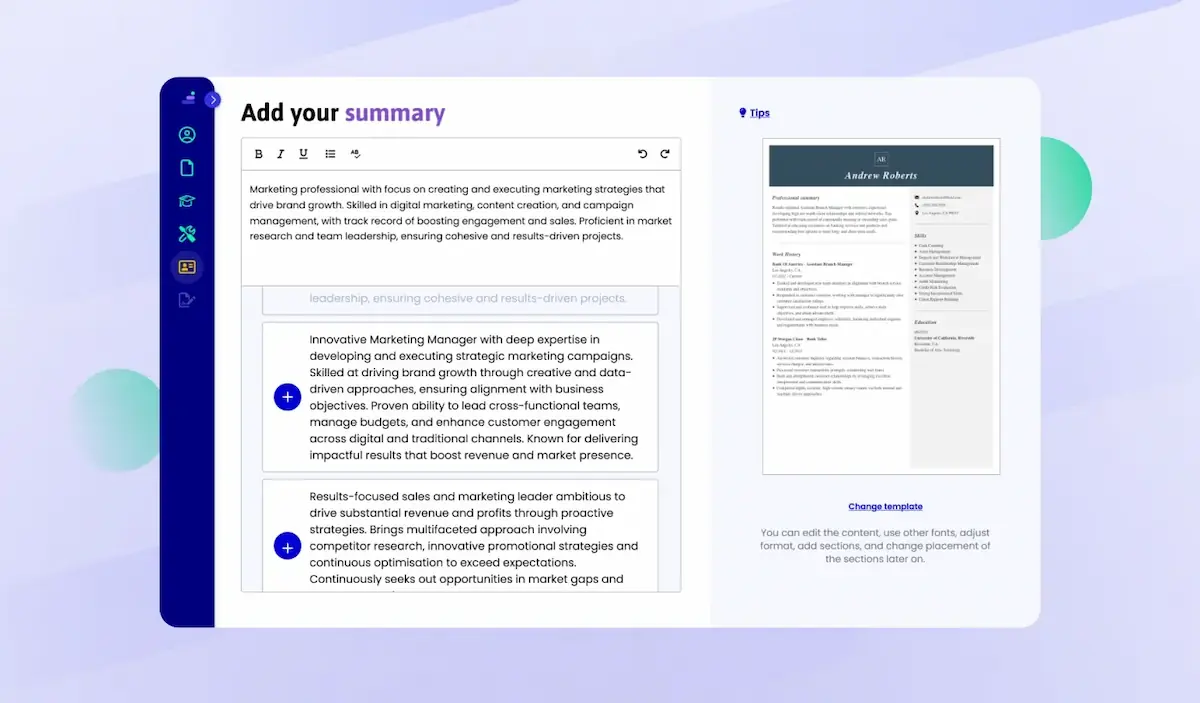
How to write a CV? While your CV structure may differ slightly from industry to industry, the same components must be there, and they are:
The CV profile, also known as a CV summary, absolutely must be included in your CV. The quick 4–6 line header is a round-up of all your best sides, and the opportunity for the recruiter to become interesting and keep on reading.
Empathetic medical receptionist with 7+ years of experience and a track record of managing 15 physician schedules. Independently scheduled 70+ appointments daily, providing service to 50+ patients a day. Maintained a 99.8% satisfaction rate thanks to actively listening to patients, and making them feel heard. Maintained 0 mistakes over 4 years due to paraphrasing, repeating back and clarifying information during phone calls and bookings.
This is where it all happens: the work experience section. Here is where you can really describe methods of active listening and how you apply them in the workplace. These CV tips should help:
Work Experience
Medical Receptionist
Heartbeat, Leeds
December 2016—Present
Writing your CV education section is as simple as listing your highest level of education and moving on—if you have a few years of experience under your belt. If it’s a student CV, you must get a bit more out of this section, and should try to add relevant modules or extracurricular activities.
Education
BA Business Administration, 2012-2015
University of Leeds
Relevant Modules: Communication in the Workplace, Psychology of Interaction
Extracurricular Activities: Captain of the Debating Society
The CV skills section could be tricky if you have already devoted some space to describing your methods of active listening in the work experience section. Active listening skills aren’t really standalone skills to list, you may end up looking a little silly writing down ‘Paying attention’ as one of your strengths.
When focusing on active listening skills, we recommend you elaborate your methods in the work experience section, and instead list about 5 hard CV skills that you know will come useful in this job position.
Skills
To make your CV perfect, make sure the bottom of it isn’t a jumble of random things and facts under an ‘Additional Info’ heading.
Structure other sections separately for Languages, Certificates and Awards to make sure your CV is clear. Add a hobbies and interests section if you have some things that you think are relevant in showing your active listening skills.
Languages
Certifications
If you’d like to improve your active listening skills, here’s an active listening learning resource the NHS has prepared to train their employees—and you can imagine how important listening is in healthcare!
Don’t forget to write a cover letter. Describing these skills can be hard in a couple lines, and there you will have 250–400 words to work your magic. Of course, you will have even more space to flaunt it in the interview! Don’t forget to nod and ‘uh-huh’! We hope they will too.
You don’t have to be a CV writing expert. In the LiveCareer CV builder you’ll find ready-made content for every industry and position, which you can then add with a single click.

If you’re still in need of more examples of active listening skills, or you just need some advice on how to include active listening skills in your CV, then let us know in the comments section. We’re here to help.
Our editorial team has reviewed this article for compliance with LiveCareer’s editorial guidelines. It’s to ensure that our expert advice and recommendations are consistent across all our career guides and align with current CV and cover letter writing standards and trends. We’re trusted by over 10 million job seekers, supporting them on their way to finding their dream job. Each article is preceded by research and scrutiny to ensure our content responds to current market trends and demand.
Category: CV Help
Crafting a job-winning CV is all about showcasing your unique skills and experiences. Start with a strong personal statement that highlights your career goals and achievements.
Try Our CV Builder Now